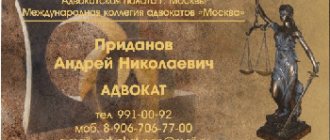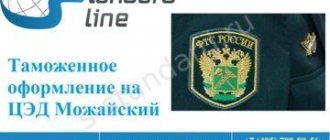New appointment
Georgy Peschanskikh became the head of the Main IT Directorate of the Federal Customs Service (FCS) . The relevant information appeared on the FCS website. Prior to this, the FCS IT department was headed by Dmitry Danilin , who left his position at the beginning of September 2021.
According to the FCS website, the Peschanskys are now in charge of developing customs IT and ensuring the cybersecurity of the department, including the fight against foreign technical intelligence and the protection of all data in customs information systems, including state secrets. Also, the new head will monitor the informatization of customs, the development of the departmental telecommunications network and special communications and radio communications networks.
In addition, under the leadership of the Peschanskys, the IT department will be involved in equipping the Federal Customs Service with customs control and security equipment, organizing control over radioactive substances, monitoring radiation safety and uniformity of measurements.
In addition, the IT department ensures the activities of the scientific and technical council of the Federal Customs Service of Russia and the Council for Information Security of Customs Authorities. The Council works as a technical commission of the Federal Customs Service for the protection of state secrets.
In addition, the IT department manages intellectual property in accordance with the 2002 government regulation and leads efforts to create open data sets. In addition, the structure now headed by Peschanskikh is preparing proposals for including FCS information systems in the register of state information systems.
Head of the Main IT Department of the Federal Customs Service Georgy Peschanskikh
The IT department also monitors the timely information and technical support of customs in accordance with the classifier of purchased products, and ensures that funds are spent efficiently on this. It also maintains the product classifier itself, draws up a procurement plan and generates costs.
Under the leadership of the Peschanskys, the IT department will put forward proposals for purchases from the Federal Customs Service, as well as the schedule for these purchases and for carrying out research and development work. In addition, the department draws up informatization plans and reports on them, and, within existing limits, makes proposals for the formation of a FCS application to the state budget. IT management also monitors the expenditure of budget funds.
Customs: border state
Every year, the number of criminal cases initiated by investigators of the Federal Customs Service of Russia is growing, which indicates both positive trends in the law enforcement activities of customs authorities and the fact that criminal activity in the field of foreign economic activity is not declining. However, some that take place, despite the three-year validity of the Labor Code of the Russian Federation and recently adopted amendments to the Code of Criminal Procedure of the Russian Federation (Federal Law dated 06/05/2007 No. 87-FZ “On Amendments to the Code of Criminal Procedure and the Federal Law “On the Prosecutor's Office of the Russian Federation”, Federal Law dated 06/06/2007 No. 90-FZ “On Amendments to the Code of Criminal Procedure of the Russian Federation”), the problems indicate insufficient legal regulation in the customs sphere. Deputy Head of the Department for Organization of Inquiry of the Directorate of Customs Investigations and Inquiry of the Federal Customs Service of Russia, Major of the Customs Service Alexey Vasilievich SEREBRO, talks about the current activities of employees of the Federal Customs Service of Russia.
What crimes do customs investigators encounter most often today?
— In accordance with the Code of Criminal Procedure of the Russian Federation, customs authorities are authorized to conduct a preliminary investigation in the form of inquiry in criminal cases of crimes provided for in Part 1 of Art. 188 and art. 194 of the Criminal Code of the Russian Federation. As a matter of fact, these compositions form the main body of work for investigators. The situation is such that approximately 90% of criminal cases are initiated on grounds of smuggling, the most common methods of committing which remain non-declaration and false declaration.
Until 2004, the structure of “customs” crime was dominated by offenses related to evasion of customs duties. According to Art. 188 of the Criminal Code of the Russian Federation qualified acts that are detected exclusively during the actual crossing of the border. All violations related directly to the customs clearance of goods at internal customs fell under Art. 194 of the Criminal Code of the Russian Federation. However, in 2004, a new Customs Code of the Russian Federation was introduced, which interpreted the concept of “movement across the customs border”, used in Article 188 of the Criminal Code of the Russian Federation, in an expansive manner. Now, not only the actual crossing of the customs border by goods and vehicles, but also all subsequent actions with them before their release by the customs authorities began to be considered movement.
Today, the range of so-called commodity smuggling is dominated by cars, consumer goods (clothing, shoes), and consumer electronics. A large number of criminal cases are initiated in connection with the smuggling of narcotic drugs and psychotropic substances. Facts of illegal export of funds in foreign currency from the country are still widespread.
How will the recent adoption of Federal Law dated June 5, 2007 No. 87-FZ “On Amendments...”, the norms of which (starting in September 2007) will be aimed at delineating the powers of the investigator and the prosecutor, affect the activities of employees of the Federal Customs Service of Russia?
— The changes and additions that have been made to the Code of Criminal Procedure of the Russian Federation will undoubtedly affect the customs authorities. However, the legislator has only given us the powers to conduct a preliminary investigation in the form of an inquiry and carry out urgent investigative actions. Law No. 87-FZ primarily deals with the division of powers of investigators and prosecutors. If we talk about customs authorities as investigative bodies, then the main innovation, of course, will be the abolition of the institution of obtaining the consent of the prosecutor to initiate a criminal case. Otherwise, the powers of supervising prosecutors in relation to investigators and the procedural decisions they make remain quite broad. Prosecutors will have the right to:
give the investigator mandatory written instructions on the direction of the investigation and the conduct of procedural actions;
cancel decisions of investigators that he considers illegal or unfounded;
remove the investigator from further investigation;
withdraw any criminal case from the investigative body and transfer it to the investigator;
approve the decision of the investigator to terminate the criminal proceedings.
In addition, the consent of the prosecutor will be necessary for the investigator when sending a request for procedural actions that are allowed only on the basis of a court decision, as well as for extending the time frame for conducting an inquiry in criminal cases. As you can see, the upcoming changes will not be something revolutionary for the investigative bodies.
What initiatives of the Federal Customs Service of Russia have recently been developed in the field of improving legislation? How often does the legislator listen to them?
— If we talk about the inquiry, then, indeed, serious changes have already taken place. We are talking about the Federal Law of June 6, 2007 No. 90-FZ “On Amendments...”, which came into force in June of this year. For many, against the backdrop of the adoption of Law No. 87-FZ, this Law may have gone unnoticed, but for us it actually became a turning point in our work.
Since 2002, when the new Code of Criminal Procedure of the Russian Federation came into force, the Federal Customs Service of Russia at various levels has repeatedly drawn attention to the fact that the period of inquiry established by law (25 days, later increased to 30) is insufficient for investigating criminal cases of smuggling and evasion of customs duties. These crimes, as a rule, were and are being committed by well-organized, stable groups, with a clear distribution of functions, and well-secured financially. Identifying the pattern of a crime and identifying the entire circle of persons involved in its commission requires considerable time, painstaking work of a large number of employees, and serious material costs.
Meanwhile, investigators were deprived of the right to even send international inquiries in criminal cases, although the need to carry out investigative actions on the territory of foreign states arose in almost every case.
Cases in which persons suspected of committing a crime were not identified could be investigated by us only in the form of urgent investigative actions.
As a result, investigators from internal affairs bodies found themselves overwhelmed with criminal cases, which customs investigators transferred according to jurisdiction due to the expiration of procedural deadlines. In 2005, customs authorities opened 3,264 criminal cases, about 2,000 of which, after the expiration of the inquiry period, were sent to jurisdiction. In 2006, 4,423 criminal cases were initiated. Over 2,700 cases in which an inquiry was conducted were sent according to jurisdiction.
Behind these figures are huge amounts of damage caused to the state as a result of crimes, the perpetrators of which remained unpunished: as practice has shown, the further fate of these cases is standard: at first they were suspended and then terminated due to the expiration of the statute of limitations for criminal prosecution.
Even in such conditions, it was possible to achieve an increase in the number of criminal cases sent to court with an indictment. I would especially like to note: in almost all cases, the courts render guilty verdicts, which can be safely credited to our investigators, who manage in a short time not only to conduct an investigation at the proper level, but also to formalize its results in full compliance with the requirements of the law.
The Federal Customs Service of Russia has repeatedly raised the issue of the need to vest customs authorities with the right to conduct a preliminary investigation in criminal cases within our competence, but the matter has not been able to move beyond the initiatives. Appeals were sent to the Government of the Russian Federation and the Prosecutor General's Office. In cooperation with other law enforcement agencies, appropriate amendments to the Code of Criminal Procedure of the Russian Federation were prepared.
Ultimately, the legislator made a kind of Solomonic decision, retaining our status as investigative bodies, but significantly increasing the time frame for criminal proceedings. Now it is possible, if an examination is ordered, to petition the prosecutor to extend the period of inquiry to six months, and when sending an international request for legal assistance - to one year. It is clear that both of these events, due to the specific nature of the criminal cases we investigate, are carried out very often.
In addition, criminal cases initiated not against specific individuals, but based on the commission of a crime, will also be investigated by customs authorities in the form of an inquiry. An important addition was the article regulating the status of the head of the investigation unit. We understand perfectly well that increased authority inevitably entails increased responsibility for the final results of work.
We can say that in June work began almost from scratch. Undoubtedly, it will take some time to establish it in the new conditions. The requirements for the personnel of investigators and for the operational support of the process of investigating criminal cases will increase significantly. It will be possible to talk about specific results and sustainable trends no earlier than the results of the second half of this year.
What legal problems arise in practice regarding the establishment, qualification and prosecution of criminal liability under the main articles of Chapter 22 of the Criminal Code of the Russian Federation? Is it necessary to make changes to the legislation and in what part? How do you assess cooperation with representatives of other government regulatory authorities? What issues need to be resolved to improve the legal climate in the interdepartmental environment?
— These issues are closely intertwined with each other in terms of our interaction with the prosecutor’s office, which, in fact, is the main subject controlling the procedural activities of customs authorities.
During the validity of the new Code of Criminal Procedure of the Russian Federation (since July 2002), a wealth of experience has been accumulated in working with the prosecutor's office. Obtaining consent to initiate criminal proceedings often became a serious problem for customs investigators. Moreover, such problems in some cases went beyond the scope of isolated facts, forming very stable trends in the law enforcement practice of entire regions. As an example, I can cite a situation that occurred not long ago in one of the regions, where customs authorities unexpectedly encountered the fact that supervising prosecutors refused to approve decisions to initiate criminal cases against citizens moving drugs across the border.
The problem was this: according to prosecutors, a prerequisite for qualifying a person’s act under Part 2 of Article 188 of the Criminal Code of the Russian Federation was the movement of drugs on a large scale, which should have been determined based on the rules established by Art. 228 of the Criminal Code of the Russian Federation according to the standards determined by Decree of the Government of the Russian Federation of 02/07/2006 No. 76. The fact that in Part 2 of Art. 188 the onset of criminal liability is in no way related to the size of the drugs being transported and was not taken into account.
As a result, a paradoxical situation arose: on the one hand, prosecutors had decisions to refuse to give consent to initiate a criminal case, on the other hand, there were guilty verdicts from courts in other regions against citizens who also transported drugs in quantities not exceeding large quantities. In general, despite such problems, as a rule, it is possible to establish joint work with the supervising prosecutor’s offices.
Difficulties are inevitable, the main thing is the presence of knowledge, common sense and the desire to resolve emerging contradictions. For example, the problem of initiating criminal cases of drug smuggling was resolved during a series of working meetings held by the leadership of the Department of Customs Investigations and Inquiries with representatives of the Prosecutor General's Office.
It should be recognized that sometimes there are situations when investigators get too carried away, taking interaction with supervising prosecutors beyond the legal framework. By virtue of their powers, the prosecutor's office has always acted in relations with customs authorities from a position of authority, as a result of which some of our employees, faced, for example, with refusal to give consent to initiate a criminal case, instead of defending their position within the framework of the current Code of Criminal Procedure of the Russian Federation by appealing the decision to a higher prosecutor, they preferred not to wash dirty linen in public and not to spoil relations by issuing a decision to refuse to initiate a criminal case.
However, we note: such examples are not widespread.
As for interaction not directly related to the investigation of criminal cases, it is ongoing. Representatives of the General Prosecutor's Office and interregional transport prosecutor's offices take part in meetings at which the results of the work of customs authorities in the area of inquiry are reviewed and priority areas of development for the future are determined. There is a constant exchange of information with other law enforcement agencies.
What crimes are difficult to solve today and for what reasons?
— There are still difficulties in initiating criminal cases of timber and timber smuggling. Currently, the government’s leadership has identified the fight against crime in this area as one of the priorities of state policy. This illegal activity is most active in the Siberian and Far Eastern Federal Districts when moving timber to China.
The number of violations of the law in the implementation of activities for the export of forest products today is very large: the value of illegally transported timber amounts to hundreds of millions of rubles. However, gaps in the current legislation very often do not allow customs to take effective measures, and criminals take advantage of such loopholes.
The most common route taken by timber and timber smugglers is through fraudulent use of documents. When carrying out export operations, participants in foreign economic activity submit counterfeit phytosanitary certificates, foreign trade contracts and constituent documents of exporting organizations, executed in violation of the requirements of the current legislation, cargo customs declarations containing unreliable information (especially valuable forest species are declared under the guise of ordinary ones, the grade is underestimated).
In order to avoid criminal liability, wood is exported in small quantities, and if the exporter is brought to justice, the value of the goods transported does not reach the large amount necessary to qualify the act under Art. 188 of the Criminal Code of the Russian Federation.
To evade responsibility for tax evasion, subjects of the timber industry use forgery of documents confirming the legality of the origin of wood, or the complete destruction of accounting documents. This makes it possible to hide illegal logging, inflate costs and make a claim for a refund of value added tax that was not actually paid.
The number of various types of violations is quite large, but not in all cases the law allows customs authorities to properly respond to them, qualifying illegal acts under Art. 188 of the Criminal Code of the Russian Federation. For example, in 2006, customs authorities repeatedly revealed the following: forest products intended for export were acquired illegally on the territory of the Russian Federation.
To justify the declared customs value, exporters submit fake invoices and logging tickets. However, we do not have the possibility of initiating criminal cases of smuggling in such cases, since documents relating to the justification of the legality of the acquisition of timber and timber products on the territory of Russia are not among the documents required for customs clearance purposes.
It seems that an effective way out of this situation could be to legislate a ban on the export of forest products acquired illegally in Russia. However, at the moment this problem, unfortunately, has not been solved.
The leadership of the Federal Customs Service of Russia is also seriously concerned about the current state of affairs with the procedure for recording, storing and, most importantly, transferring material evidence in criminal cases.
During the investigation of criminal cases, significant quantities of goods are recognized as material evidence. Their storage, as a rule, is carried out in temporary storage warehouses and costs the customs authorities a “round” sum.
When transferring criminal cases under jurisdiction to other law enforcement agencies, material evidence in accordance with criminal procedural legislation is also subject to transfer. And they are transmitted. But only formally. Meanwhile, in fact, the preliminary investigation body does not take any measures to take on the burden of ensuring their storage. The exception is the so-called liquid goods, which can be easily sold through the structures of the Russian Federal Property Fund.
As a result, today the practice remains in which items recognized as material evidence in criminal cases continue to be stored in places determined by customs investigators even after the end of the investigation (termination of the criminal case or its sending to the prosecutor with an indictment) or transfer of the case for preliminary investigation to other law enforcement agencies.
This fact is primarily due to the regulatory lack of regulation. The current instruction on the procedure for seizing, recording, storing and transferring material evidence in criminal cases was developed back in 1989. In 1999, some changes were made to it, but in fact this document does not correspond to modern realities at all.
Currently, most law enforcement agencies (the Federal Customs Service of Russia is no exception) have developed departmental instructions on the procedure for handling material evidence. However, it appears that there is a need to create a single interdepartmental document that could bring law enforcement practice in this issue to a common denominator.
ATTENTION!
Tomorrow, Clerk will start training in an online training course to obtain a certificate that will be included in the state register. Course topic: management accounting .
- Duration 120 hours in 1 month
- Your ID in the Rosobrnadzor register (FIS FRDO)
- We issue a Certificate of Advanced Training
- The course complies with the professional standard “Accountant”
Increase your value as a specialist in the eyes of the director. View full program
Work history
Georgy Peschanskikh, born in 1962, has experience working in state security agencies, where he was an employee from 1992 to 1995. Since 1995, he has worked in the tax police of the Sverdlovsk region. In 2001, he took the post of deputy head of the Main Information Technology Directorate of the Federal Tax Police Service (FSNP), and then served as head of the information technology department of the FSNP.
How to unlock all the possibilities of 5G?
Internet
In addition, Peschanskikh has experience working in the Federal Service for Drug Control (FSKN), where he served as deputy head of the information and analytical department of the Department of Interdepartmental and Information Activities. Peschanskikh received a scientific degree of Candidate of Sciences in Economics and Physics and Mathematics, and is a professor at the Academy of Security, Defense and Law Enforcement.






